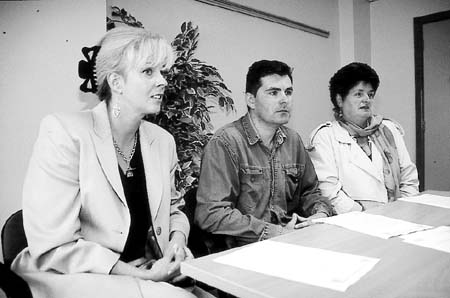Community leaders and human rights activists have launched a checklist of key principles to assist the public in evaluating the proposals for future policing to be disclosed in the forthcoming report by the Patten Commission. The launch was held on Tuesday, 31 August, at the Falls Community Council in Belfast and in attendance were Clara Reilly of the United Campaign Against Plastic Bullets, Mark Thompson of Relatives For Justice, and Toni Carragher of the South Armagh Farmers and Residents Committee.
Among those sponsoring the awareness exercise are leading human rights activists and community workers, and the checklist will now be circulated throughout the nationalist community. Members of the public will be encouraged to use the checklist as an aid in evaluating the contents of the Patten Commission's report. It is hoped that the exercise will stimulate mature reflection on the long awaited Patten Commission report and clarify the key principles which must underpin the `new beginning in policing' envisaged in the Good Friday Agreement.
The community activists are asking questions uin advance of the Patten report in light of the Good Friday Agreement's obliging of the Patten Commission to produce proposals for that new beginning in policing.
They have outlinede ten ways in which people can evaluate the Patten Commission's proposals for a new police service.
1. Will there be 43 per cent nationalists at all ranks and within all departments of the new service?
2. Will members of the new service be banned from the Loyal Orders and similar secret organisations bound by oaths?
3. Will communities have a real say in how their areas are policed? Will there be structures of accountability to (i) the public, (ii) the Irish Government?
4. Will there be new faces in the top jobs of the new police service? Will Ronnie Flanagan have gone?
5. Will the uniform, symbols and name of the new service reflect all cultures in society?
6. Will the Stalker/Sampson /Stevens reports on collusion and shoot-to-kill finally be published? Will there be a fully independent investigation into all previous police violations of human rights?
7. Will members of the public have access to information about them which were on RUC files?
8.Will former RUC members applying to join the new policing service be screened to ensure that they have not been involved in human rights abuses?
9. Will members of the new service be dismissed if they ill-treat any section of the community?
10. Will the new service be routinely unarmed and will plastic bullets be banned?
These pointers are important to nationalists given that numerous reports into the RUC in the past have never delivered meaningful change.
![[An Phoblacht]](http://republican-news.org/graphics/title_gifs/aprn.gif)
